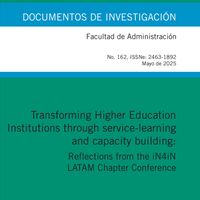Abstracto
-
The National Technical University (UTN) was created to meet the country’s development needs
in regards to technical education, at all levels of higher education. In terms of research, the institution is
oriented towards applied research, seeking to offer alternatives to the problems that plague the socio-productive
sectors of the country. The purpose of this work is first, to present research projects that have been
proposed to solve the problems in the use of organic waste of certain productive activities, and second, to
show the importance of linking the university with important sectors within the regions where the UTN is
present. The methodology used in this work is the presentation and analysis of cases of projects proposed
in three of the university campuses, based on information established in reports of the projects already
executed in two of the cases, and in the proposal of a project to be carried out during the year 2025.
The main results of the cases presented were the creation of a socio-environmental business model for
the production of different biomaterials from pineapple waste biomass and the use of residue from the
agricultural industry to produce bioferments, compost, and animal nutrition. Moreover, the projects allowed
the participation of different actors like the Research and Transfer Area of the UTN campuses, companies
representing agricultural activities, producers and supporting institutions, in addition to the incorporation
of students, both at the level of professional practices and in the development of complementary research.
As a conclusion, it is important to establish different linkage mechanisms between the academia and the
productive sectors of a territory, region or country. Such linkage allows the identification of opportunities
to develop applied research projects aimed at solving real and relevant problems of different economic
activities. Besides, it is clear that there is a need to incorporate undergraduate and graduate students in
research projects linked to the productive sectors, which helps to generate their service-learning competencies
through the practical experiences in which they participate.
